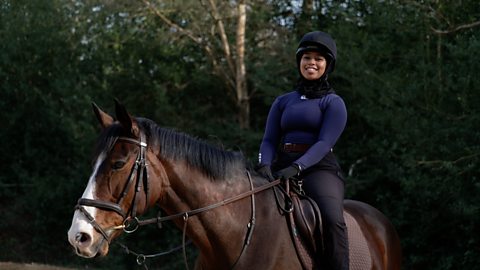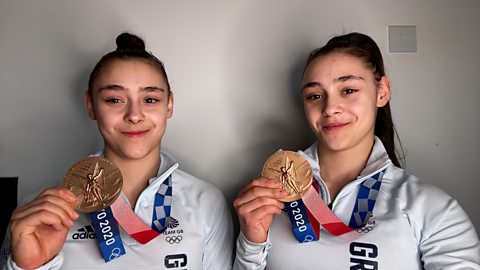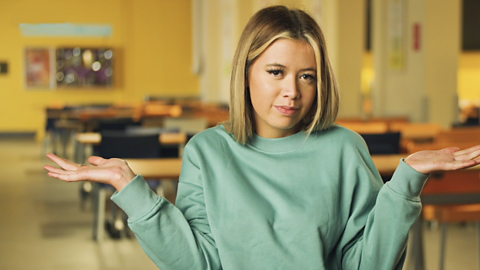There are loads of benefits to keeping fit and exercising – it can improve your mood, reduce stress and even help your performance in school! But what if you think exercise just isn't for you?
Well don't worry, exercise doesn't just mean sport – any physical activity that gets your heart pumping will help improve your fitness and there are LOADS of ways to do just that!
The NHS has guidelines on the type and amount of daily physical activity recommended for children and young people. You can read them
If you're looking for a new sport to try and are stuck for ideas, watch this video to see what Paralympian sprinter Thomas Young and jockey Khadijah Mellah have to say!
Thomas: Hi I’m Thomas Young and I'm a British Paralympic 100 meter sprinter.
Khadijah: And I’m Khadijah Mellah, an award-winning jockey known for being the first Muslim to compete and win in the UK. There are loads of benefits to keeping fit and exercising – it can help improve your mood and reduce stress and even increase your performance at school! The World Health Organisation says that young people should get about 60 minutes of moderate to rigorous exercise each day, but what if you think exercise just isn't for you?
Thomas: Some people think they are too busy to exercise, they might be too embarrassed or nervous, or not have the right opportunities to participate. I found it so difficult to find a running club, but I’m so glad I did – it has changed my life!
Khadijah: Whatever your physical ability, there are many ways to enjoy an active lifestyle in a way that’s right for you, and when you find the activity that works best for you, there are so many positive effects!
Thomas: So think about how you can get some exercise into every day – walk or cycle where you can, or take the stairs… Exercise doesn't just mean sport – dance, jump and play more – just get that heart pumping! You don't have to meet your 60 minute target every day – you can build up gently.
Khadijah: But if you want to try a new sport, there are so many different kinds out there, and it may just be that your favourite sport is something you've never heard of.
Thomas: Have you heard of:
Khadijah: Goalball?
Thomas: Boccia?
Khadijah: Ultimate Frisbee?
Thomas: Kabaddi?
Khadijah: Korfball?
Thomas: Or Jag Tag?
Khadijah: I never thought I would get into horse riding, but now I can't imagine doing anything else! I started out volunteering at my local city farm and the rest is history!
Thomas: You can do some research and see what sports are out there to do! You can either go online, you can speak to your PE teacher or you can even go down to your local club and ask if there's any free sports in your area.
Khadijah: So you could head to your local park and try a sport that doesn't require a lot of equipment, like running, walking, football or frisbee!
Thomas: For my favourite sport, sprinting, all you need is a pair of trainers or spikes!
Khadijah: It's important to have fun, but if you are new to exercise, make sure you warm up, and don’t overdo it.
Thomas: Remember, if you find an activity you like, you’ll be more likely to keep at it…
Khadijah: So what’s it going to be?
Your new favourite sport may be something you haven't even heard of yet. But with a little bit of guidance you could be the next god of goalball, king of korfball or boss of boccia!
Check out our quick guides below for some ideas of sports you could try.
Korfball
If you're looking for something that is dynamic, fast-paced and really fun, then look no further than korfball! If you mix together elements from netball, basketball and handball you get korfball, an inclusive mixed-gender game from the Netherlands. The aim of the game is to get the ball through the 'korf', a yellow basket on the end of a 3.5 meter pole.
Goalball
Developed in 1946 to help rehabilitate visually impaired World War II veterans, goalball has gone on to become one of the highlights of the Paralympic Games. Goalball is open to both male and female players who are visually impaired, but as all players wear tinted eyeshades, sighted players can also join in. You score goals by rolling the ball into the opposition goal; the court has tactile markings and the ball contains a bell to help players locate it.
Ultimate frisbee
Ultimate frisbee is a non-contact team sport where there is no referee, so you need to play fair! You can't run or walk with the disc in your hands and players try to score points by catching the disc in the end-zone. Ultimate frisbee can help develop your speed, stamina and agility – so it's great for improving fitness.
Boccia
If you enjoy games of tactics, skill and tension, then boccia might just be the sport you're looking for! Originally designed for people with physical disabilities, boccia can also be played socially by able-bodied people. You score points by rolling your ball as close to the white 'jack' as possible; the more balls you get nearer to the jack than your opponent, the more points you score.
Jag tag
Jag tag is a simple adaptation of touch American football and is currently played in over 300 schools across the UK. It's suitable for all abilities and you'll learn basic techniques of throwing, catching, evading and defending.
Kabaddi
Kabaddi originated in India but is now played in many countries, including the UK. If you take British bulldog, combine it with wrestling, throw in a bit of rugby, but take away the ball, you'll get kabaddi. This high-impact sport might not be everyone's cup of tea, but if you like a game of physical power and speed, then it could be for you.
If none of these sports take your fancy, then check out ±«Óătv Sport's Get Inspired guide for a list of sports that may be more your thing.

Things to remember when exercising
If you're new to exercise, start gently and don’t overdo it. Make sure you warm up before you exercise, whether you’re new to exercise or not – this can help prevent injury
Exercising too late in the day can make it hard to switch off and go to sleep, so exercise earlier in the day. For some tips on creating a good bedtime routine, take a look at this article by YouTuber Nayna Patel
Don’t worry about hitting the recommended targets straight away. Every little helps and it’s more important to find an activity that you enjoy
If you ever have health concerns in relation to exercise, you should speak to a healthcare professional
If you find that exercise is making you feel worried or unhappy, then talk to a trusted adult and seek support

If you need support
You should always tell someone about the things you’re worried about. You can tell a friend, parent, guardian, teacher, or another trusted adult. If you're struggling with your mental health, going to your GP can be a good place to start to find help. Your GP can let you know what support is available to you, suggest different types of treatment and offer regular check-ups to see how you’re doing.
If you’re in need of in-the-moment support you can contact , where you can speak to a counsellor. Their lines are open 24 hours a day, 7 days a week.
There are more links to helpful organisations on ±«Óătv Action Line.

How exercise can help your mental health
Jockey Khadijah Mellah talks about how exercise can help your mental health.

How exercise can help with revision
Team GB Olympic gymnasts Jessica and Jennifer Gadirova tell us how exercise can help with your revision.

Revision: Timetables and planning
Some top tips to help you get organised with your revision.
